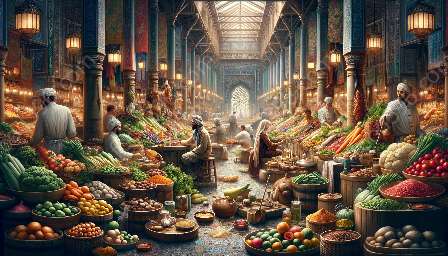Early modern cuisine was heavily influenced by the use of spices and exotic ingredients, which played a vital role in shaping the history of cooking. These ingredients held significant importance in not only flavoring dishes but also in shaping global trade, cultural exchange, and culinary traditions.
The Significance of Spices and Exotic Ingredients
During the early modern period, which spanned roughly from the 15th to the 18th century, the demand for spices and exotic ingredients grew exponentially as European explorers and traders ventured into new territories, encountering a wide array of previously unknown culinary treasures. Spices such as pepper, cloves, cinnamon, and nutmeg, along with exotic ingredients like cocoa, vanilla, and turmeric, were highly sought after for their unique flavors and perceived medicinal properties.
Not only did these ingredients enhance the taste of food, but they also symbolized wealth, status, and power. Their scarcity and the arduous journeys required to obtain them made spices and exotic ingredients coveted commodities, often commanding exorbitant prices in the markets of the time.
The Impact on Culinary Traditions
The influx of spices and exotic ingredients from distant lands had a profound impact on culinary traditions across the globe. In Europe, these ingredients revolutionized the way food was prepared and consumed. The blandness that once characterized many European dishes gave way to vibrant and aromatic flavors, ushering in an era of gastronomic exploration and experimentation.
Furthermore, the incorporation of these new ingredients significantly expanded the culinary repertoire, leading to the creation of innovative recipes and culinary techniques. The resulting fusion of flavors and styles gave birth to a rich tapestry of early modern cuisine, reflecting the influence of diverse cultures and ingredients from around the world.
Global Trade and Cultural Exchange
The trade of spices and exotic ingredients had far-reaching implications beyond the realm of food. It fueled the age of exploration and the establishment of extensive trade networks, connecting distant lands and reshaping the global economy. This exchange of goods and ideas not only transformed culinary practices but also facilitated the interchange of cultures, traditions, and knowledge.
Early modern cooking became a melting pot of culinary traditions, as ingredients and cooking techniques from different regions intertwined, giving rise to new and hybridized culinary styles. The integration of foreign flavors and ingredients into established culinary traditions led to the evolution of diverse and dynamic food cultures, enriching the global culinary landscape.
Legacy in Cuisine History
The legacy of spices and exotic ingredients in early modern cooking endures to this day, shaping the foundations of modern cuisine history. The impact of these ingredients transcends mere culinary innovation, encompassing social, economic, and cultural dimensions.
The historical significance of spices and exotic ingredients is evident in the enduring popularity of dishes and culinary traditions that have been shaped by their influence. From the spice-infused curries of India to the indulgent chocolate-based delicacies of Europe, the culinary heritage of early modern cooking continues to captivate and inspire food enthusiasts worldwide.
Ultimately, the exploration and exploitation of spices and exotic ingredients during the early modern period laid the groundwork for the interconnected global cuisine we know today. Their role in shaping the history of cooking serves as a testament to the profound impact of these seemingly simple yet transformative elements on our culinary heritage.

